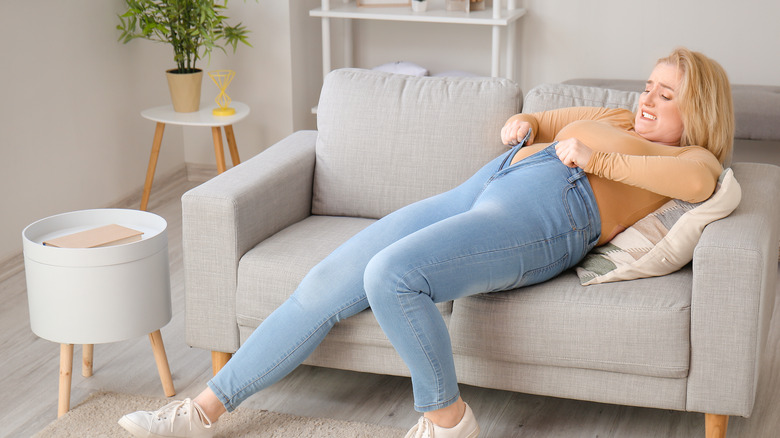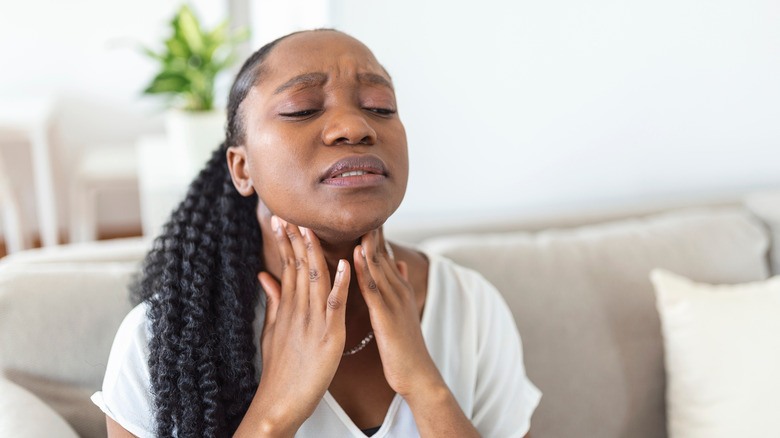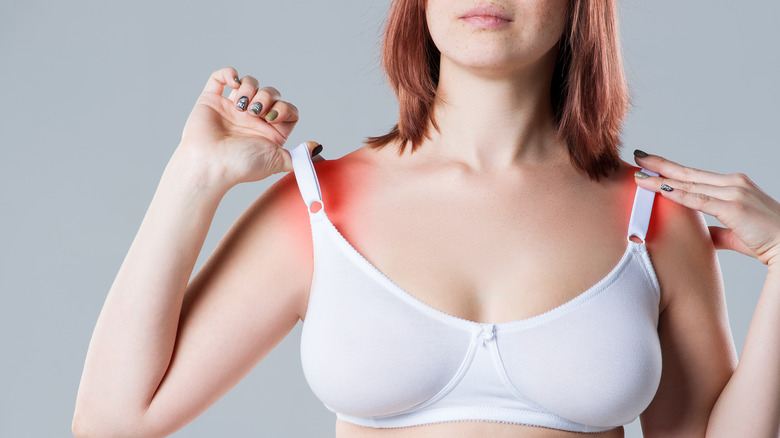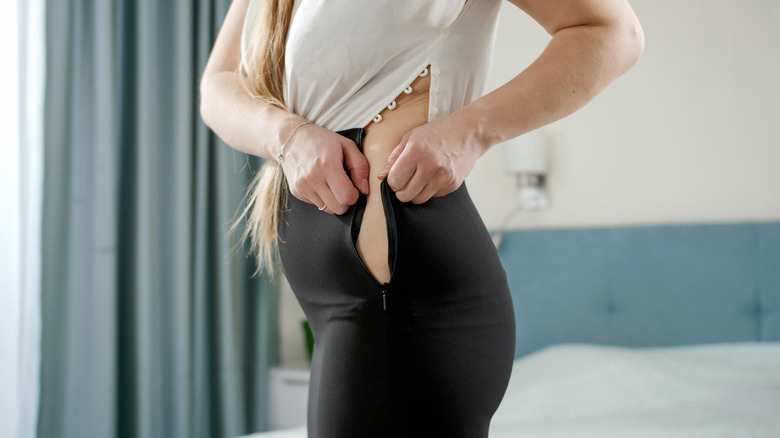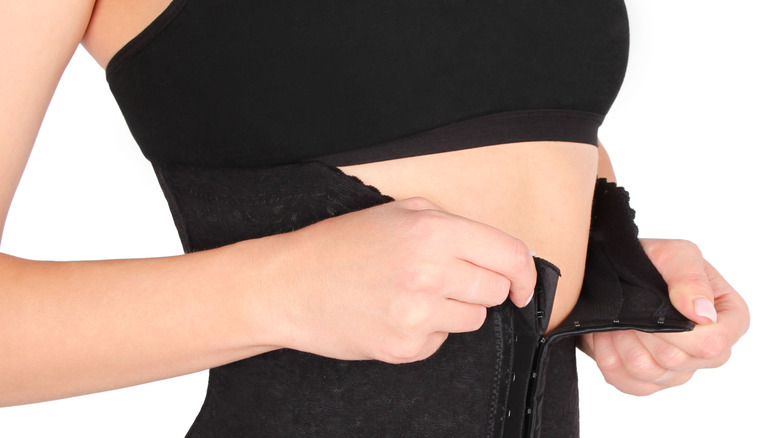When You Wear Tight Clothing Every Day, This Is What Happens
Tight clothes: you've probably worn them at some point in time all in the name of fashion or out of necessity. Whether they are tight leggings for a yoga class, a dress for a formal occasion, or just your classic pair of skinny jeans, it can be hard to avoid them.
While they may look good on you, it's no secret that wearing clothes that are too tight can be uncomfortable. However, the discomfort of wearing tight clothing may be more problematic than you think.
Experts say wearing tight clothing on a regular basis can have a negative impact on your health long-term. Tight clothing can affect digestive health by suppressing your lymphatic system, and can cause nerve issues due to compression, according to experts at Lifehack.
Furthermore, restrictive undergarments can cause acid reflux issues, resulting in heartburn and ulcers. The diaphragm's function can also be affected by overly snug clothing, which means your breathing capabilities can be hampered.
While wearing tight clothing occasionally may not cause dramatic results, it's best to be aware of potential concern. Continue reading to get the full scoop on how exactly tight clothes can negatively impact yourself, and learn how to find a better fit.
It can cause intestinal distress
There are few things more uncomfortable than being gassy, bloated, and trapped in a tight outfit. Shapewear in particular has been known to cause problems in this department, as the fabric used to help shape the body is extremely tight and is actually designed to manipulate the shape of your abdomen, where your intestines are. According to experts at the Cleveland Clinic, if your shapewear is not properly fitted, it can contribute to both gas and bloating after meals. This is because the gas that is naturally produced as you digest your food, or simply from the air your swallow has nowhere to go. Hepatologist Jamile Wakim-Fleming, spoke to the site and explained, "You're slowing the free motion of the gastrointestinal system and trapping the gas inside."
Furthermore, Healthline points out that tight clothes may worsen symptoms of irritable bowel syndrome or Crohn's disease for those dealing with the gastrointestinal disorders. Registered dietician Michelle Rauch spoke to the site and echoed what Wakim-Fleming mentioned by stating, "Tight-fitting clothes have the capacity, when 'too tight,' to put additional stress on the stomach and intestines."
You might get acid reflux
Acid reflux is another side effect of wearing tight clothing that is closely linked to the digestive process. According to Medical News Today, acid reflux occurs when acid from the stomach is forced up the esophagus, and what we know as heartburn is the burning sensation that accompanies the acid reflux. Dr. Anthony Kouri, orthopedic surgeon at the University of Toledo Medical Center spoke to Tums, and explained that wearing shapewear can contribute to the occurrence of acid reflux, as "It places pressure on the stomach and forces gastric acid into the esophagus."
It isn't just shapewear that is a no go for those who suffer from heartburn — the experts at the Maryland Surgery Center explain that activewear may also be a culprit. The site says that these types of clothes are known to make symptoms worse for those who regularly deal with heartburn, as the clothes place pressure on the midsection. Types of clothes experts suggest avoiding include "Active Bottoms with Snug Waistbands or Control Tops," and instead replacing them with a "slouchy pair of jogger pants" that have a drawstring. They also warn against "Tight-Fitting Sports Bras," and going up a size if you find that yours fits too tightly around your ribcage.
It might cause nerve damage
The last thing you were probably thinking about before sliding into your favorite pair of skinny jeans was that they might cause long lasting nerve damage, but research suggests that it's not too far-off a possibility. CNN reports that one woman strapped on a pair of particularly tight jeans and ended up in the hospital after she lost feeling in her legs. A study published in The Journal of Neurology, Neurosurgery, & Psychiatry that observed the case noted that the 35-year-old Australian woman had been wearing skinny jeans on a day she helped her family move furniture. She was frequently squatting and clearing cupboards throughout the day, and noticed that her jeans became tighter and tighter as the day went on. Later, she noticed that her leg had become numb, and collapsed onto the ground where she was later taken to the hospital. After she arrived at the hospital, doctors had to cut the woman out of her jeans because her legs had swollen so intensely.
Dr. Thomas Kimber who treated the young woman spoke to CNN and explained, "Normally muscles can expand to compensate for swelling, but there was a tourniquet effect, so the muscles had to expand inwards and compressed blood vessels and nerves ... If she hadn't been able to come to the hospital, the compression could have gone on longer and caused residual nerve damage."
Your skin may become irritated
In addition to getting on your nerves (both literally and figuratively), too tight clothing may also be downright irritating — to your skin, that is. There are few things closer to your skin than your clothes, and when they are particularly tight, the close quarters can lead to unwanted friction. Josh Zeichner, dermatologist and director of cosmetic and clinical research in dermatology at Mt. Sinai Hospital in New York City, spoke to Cosmopolitan and explained that when you're wearing tight clothes, the fabric "rubs against your skin, which disrupts the skin barrier that protects you from infections."
Furthermore, if you are wearing skinny jeans, the button is more likely to press up against your skin, which can cause an allergic reaction if the button is made of nickel, a common skin irritant.
WebMD explains that the official name for irritated skin that results from clothing is called "textile dermatitis," and is more commonly diagnosed in women because they tend to wear tighter clothes. The site explains that the irritation usually occurs in "the crooks of your arms," "behind your knees," and "any place where your clothing is tight." If your clothing is irritating you, experts suggest swapping out tight clothes for looser fitting ones made from natural fabric.
You might faint
Fainting may seem like a dramatic consequence of wearing tight clothes, but to stay on the safe side, it may be best to loosen things up a little. According to Healthline, fainting, which is also known as syncope, is defined as a temporary loss of consciousness due to a decrease in the amount of blood flow to your brain. There are many reasons why someone might faint, and wearing tight clothes (particularly with a tight collar) is a contributing factor, according to the site. Some of the symptoms of syncope include feeling dizzy, lightheaded, cold, clammy skin, changes in vision, ear ringing, and blacking out.
In addition to the different reasons someone might faint, there are also different types of syncope including reflex syncope, cardiac syncope, orthostatic syncope, and cerebrovascular syncope.
The type of syncope associated with wearing tight clothes is reflex syncope, which according to the site is the most common type of fainting. Healthline explains that reflex syncope occurs "when certain reflexes are not properly regulated." In this case your heart slows down, blood pressure drops, and the flow of blood to your brain decreases. This is most likely to occur when you are wearing a shirt with a tight collar that presses up against the carotid artery, located in the neck. If this happens for too long, you may experience symptoms such as lightheadedness, tunnel vision, and blackout.
You may be more prone to fungal and yeast infections
One of the nasty side effects of wearing tight clothing is that it may lead to unwelcome skin infections. As previously mentioned, tight fabric can rub up against your skin, causing damage to the delicate barrier that protects it against infection. Dermatologist Josh Zeichner said to Cosmopolitan that in addition to damaging your skin barrier, the tightness of your clothes may lead you to sweat more, creating the perfect environment for "viral, fungal, and bacterial infections, such as folliculitis." Experts at Self echo that sentiment and explain that wearing skinny jeans may "increase your risk" of developing a yeast infection. Tami Rowen, ob/gyn at UCSF Medical Center specializing in sexual health, spoke to the magazine and said that tight pants may contribute to an accumulation of moisture and heat inside the vagina, which, again, increases the likelihood that bacteria and yeast will proliferate.
Additionally, according to WebMD, tight clothing may also contribute to a type of skin condition called intertrigo. This is an inflammatory skin condition that occurs as a result of skin rubbing up against itself due to trapped moisture. The constant rubbing damages the skin barrier, and the moisture that is present multiplies the amount of bacteria and fungus naturally found on your skin, causing a rash. There are several contributing factors to this skin disorder including obesity, excessive sweating, and living in a hot and humid environment. As a measure of prevention, experts at WebMD suggest avoiding wearing tight clothes.
Your lymphatic system may be negatively impacted
Another potential complication that could arise from wearing tight clothing is a disruption to your lymphatic system. According to the Cleveland Clinic, the lymphatic system is a key part of your immune system, and consists of organs, tissues, and vessels that pump what is called "lymph" into your blood. Its job is to help maintain proper levels of fluid inside your body, protect it from foreign invaders, and absorb fat from your digestive tract. Experts at Kalon Spa in Bellevue that focus on lymphatic health explain that tight clothing may interfere with the proper functioning of your lymphatic system. They explain that your lymphatic system sits close to the skin, and that when you wear tight clothes, it actually can restrict or slow down the natural flow of the lymph.
One specific condition that could result from reduced lymph flow is called genital lymphedema, which is when lymph fluid builds up in the genital area due to a blockage, and leads to swelling of the soft tissue (via the Cleveland Clinic). Meanwhile, the American Cancer Society notes that wearing "tight or restrictive clothing" may lead to a buildup of fluid in the legs, potentially increasing the pressure in the lymph vessels. Experts at the site say that reports have linked this experience to the early stages of lymphedema.
You could develop shoulder and back pain
Aside from getting on your nerves and being irritating, tight clothes can literally be a pain in the neck. For women, the search to find the right size bra can feel exhausting. There are a lot of factors to consider, and if you end up sizing down, your undergarment can contribute to upper back pain. Healthline explains that a too-tight bra can lead to shoulder strain. Robynne Winchester, owner of Bay Area lingerie chain Revelation in Fit, spoke to the site and explained, "The most common bra fit issue is a cup that's too small and a band that's too loose. This results in a bra that is unsupportive, uncomfortable, and leads to issues such as shoulder and back pain." If the band is too loose, women may end up tightening the straps, Winchester says, which can put pressure on the shoulders. One way to reduce shoulder and neck pain is to make sure that the band of the bra is level, meaning that it is "not too tight or too loose," she explains.
In addition to bras for daily use, sports bras can also cause neck and back pain, according to experts at Well + Good. Jessica McManus, physical therapist and owner of Full Circle PT and Wellness, spoke to the site and explained that if the straps are too tight, they can put a lot of pressure on your neck, shoulders, and back.
Your sperm count could decrease
Men, this one's for you! If tight jeans (or fitted briefs) are your thing, you may want to rethink these style choices and opt for something that offers a little more breathing room. In a study published by The Journal of Human Reproduction, researchers found that men who wore looser fitting boxers had a 25% higher sperm count than men who wore tight briefs. The research was conducted by a team at the Harvard T.H. Chan School of Public Health. Lidia Mínguez-Alarcón, a lead author of the study and research scientist at the Harvard Chan School, spoke to the university's website and explained, "These results point to a relatively easy change that men can make when they and their partners are seeking to become pregnant."
In addition to having a higher sperm count, the men who wore loose fitting boxers had a higher number of what are called "motile sperm," which is the type of sperm that is more able to make its way to the egg. Furthermore, these men had 14% less follicle stimulating hormone, which assists in the production of sperm. Senior author of the study, Jorge Chavarro, went on to say, "Beyond providing additional evidence that underwear choices may impact fertility, our study provides evidence, for the first time, that a seemingly random lifestyle choice could have profound impacts on hormone production in men at both the level of the testis and the brain."
Signs your clothes are too tight
Now that you know about all of the potential pitfalls of wearing tight clothes, you might be wondering how tight is too tight? And: How do I know if my clothes are tight at all? According to Healthline, wearing clothes that are "snug" may not be a problem in and of itself, but when your clothes start to cause you pain or discomfort, that's your first sign that they may be too tight. Some of the signs you'll notice if your clothes are a bit too snug include red marks, as well as marks on your skin from the pressure of the clothes, irritated skin, numbness or tingling, labored breathing, and limited range of motion.
Experts at Insider share that your clothes can also provide telltale signs that they're too small with certain indications. For example, on tops with buttons, if the closure around the buttons is being pulled and making an 'x' shape, you should probably size up. James Thomson-Sakhrani, founder of Style Standard, explained, "If you're seeing the fabric pull away from the button in a clear 'X' pattern, it means the garment is too small or too narrow." Another thing to look out for is the stitching along the shoulder. Experts say that if the stitching stops before the beginning of the edge of your shoulder, your top is likely too small.
Types of clothes that are often too tight
There are certain types of clothes that tend to run toward the tight and clingy end of the spectrum when it comes to fit, and it helps to know what they are. Most of us are probably familiar with skinny jeans, the style of jeans that is snug to the body and is known to hug curves. According to experts at Dr. Axe, studies show that as previously mentioned, these extra tight jeans are linked to low sperm count in men, and a number of adverse vaginal health conditions including bacterial vaginosis, yeast infections, and vaginal irritation.
Another trend that has risen in popularity over the years is the use of waist trainers, devices similar in appearance to a corset that are used to shrink the shape of the waist to achieve an hourglass figure. Experts at Healthline say that this shapewear trend is dangerous and a risk to your health for a number of reasons. They make it harder to breathe, can weaken your core and pelvic floor, and can damage your internal organs if worn consistently.
Additionally, as mentioned, workout gear can also be problematic, with leggings in particular being the tightest of the bunch. Popsugar spoke to pelvic-floor physical therapist, Hayley Kava, PT, who explained that lounging in tight leggings may actually be more troublesome than wearing them occasionally to the gym — as you are sitting in them for a longer period of time. If you want to feel comfortable at home, she suggests wearing sweatpants.
How to find better fitting clothes
Finding clothes that fit right can be a challenge, and experts at WebMD explain that if you've been having a rough time, it's not really your fault. The site says that overall, body shape and size has been changing considerably in the United States over time, and that the clothing industry has not kept up to date with evolving standards. To make matters more confusing, George Simonton, professor of fashion design at New York's Fashion Institute of Technology, spoke to WebMD and explained that some brands will use what is called "vanity sizing." This means they size down their clothes, labeling a dress size 6, instead of size 8, for example, to make shoppers feel less self-conscious. While this may have you ending up in clothing that is too big, it can nonetheless be confusing, so Simonton says to ditch the sizing all together and just go with what feels comfortable on your body.
Another way to find clothes that fit your body? Get them custom made. If you don't have access to a local tailor, WebMD explains that a California-based company called Archetype Solutions has developed a type of technology that can custom make clothes for you based on a computerized system that takes the measurements you input. The system also makes adaptations based on information you provide about your "style and fit preferences," and does all of this at an affordable price.

